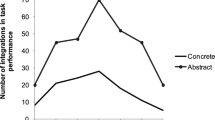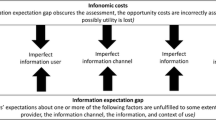Abstract
On the one hand, management accounting systems increase in complexity, and the frequency and intensity of use of the provided information for decision-making are rising. On the other hand, there is evidence that the provided information is inaccurate, which in most cases incurs economic costs. This paper analyzes the impact of biases in raw accounting data on the accuracy of the provided decision-influencing information. The simulation study presents results concerning single and multiple biases which are intendedly entered into traditional costing systems. The presented results give insights into interactions among biases and indicate that multiple input biases do not necessarily affect the information quality negatively. Surprisingly, in some setups interactions among biases lead to a mitigation or even a compensation among themselves. Furthermore, the findings can constitute the basis for generating efficient organizational data quality policies, i.e., results indicate where (not) to tolerate biases and how to prioritize actions regarding information quality with respect to accuracy and cost of accuracy.



Similar content being viewed by others
References
Arya A, Glover J, Sunder S (1998) Earnings management and the revelation principle. Rev Acc Stud 3(1):7–34
Babad YM, Balachandran BV (1993) Cost driver optimization in activity-based costing. Acc Rev 68(3): 563–575
Baiman S, Lewis BL (1989) An experiment testing the behavioral equivalence of strategically equivalent employment contracts. J Acc Res 27(1):1–20
Ballou D, Madnick S, Wang R (2003) Special section: assuring information quality. J Manag Inf Syst 20(3):9–11
Banham R (2002) Reality budgeting. CIO Insight 17:43
Barefield RM (1970) A model of forecast biasing behavior. Acc Rev 45(3):490–501
Biros DP, George JF, Zmud GW (2002) Inducing sensitivity to deception in order to improve decision making performance: a field study. MIS Q 26(2):65–65
Bouwens J, Abernethy MA (2000) The consequences of customization on management accounting system design. Acc Org Soc 25(3):221–241
Brignall S (1997) A contingent rationale for cost system design in services. Manag Acc Res 8(3):325–346
Bruns JWJ, McKinnon SM (1993) Information and managers: a field study. J Manag Acc Res 5:84–108
Burns J, Scapens RW (2000) Conceptualizing management accounting change: an institutional framework. Manag Acc Res 11(1):3–25
Cassia L, Paleari S, Redondi R (2005) Management accounting systems and organisational structure. Small Bus Econ 25(4):373–391
Chenhall RH (2003) Management control systems design within its organizational context: findings from contingency-based research and directions for the future. Acc Org Soc 28(2–3):127–168
Chong VK (1996) Management accounting systems, task uncertainty and managerial performance: a research note. Acc Org Soc 21(5):415–421
Christensen J (2010) Accounting errors and errors of accounting. Acc Rev 85(6):1827–1838
Christensen J, Demski J (1997) Product costing in the presence of endogenous subcost functions. Rev Acc Stud 2(1):65–87
Cooper R, Kaplan RS (1988) Measure costs right: make the right decision. Harv Bus Rev 66(5):96–103
Crossman PT (1958) The nature of management accounting. Acc Rev 33(2):222
Datar S, Gupta M (1994) Aggregation, specification and measurement errors in product costing. Acc Rev 69(4):567–591
Davis JP, Eisenhardt KM, Bingham CB (2007) Developing theory through simulation methods. Acad Manag Rev 32(2):480–499
Dechow P, Ge W, Schrand C (2010) Understanding earnings quality: a review of the proxies, their determinants and their consequences. J Acc Econ 50(2–3):344–401
Demski JS, Feltham GA (1976) Cost determination. A conceptual approach. Iowa State University Press, Ames
Drury C, Tayles M (1995) Issues arising from surveys of management accounting practice. Manag Acc Res 6(3):267–280
Dye RA (1988) Earnings management in an overlapping generations model. J Acc Res 26(2):195–235
Ezzamel M, Lilley S, Willmott H (1996) The view from the top: Senior executives’ perceptions of change management practices in UK companies. BRIT J Manage 7(2):155–168
Feltham GA (1968) The value of information. Acc Rev 43(4):684–696
Fox HW (1961) Statistical error concepts related to accounting. Acc Rev 36(2):282
Garg A, Ghosh D, Hudick J, Nowacki C (2003) Roles and practices in management accounting today. Strateg Financ 85(1):30–35
Gilbert N (1995) Simulation: an emergent perspective. http://alife.ccp14.ac.uk/cress/research/simsoc/tutorial.html. Accessed 05 Oct 2010
Gupta M (1993) Heterogeneity issues in aggregated costing systems. J Manag Acc Res 5:180–212
Harrell A, Harrison P (1994) An incentive to shirk, privately held information, and managers’ project evaluation decisions. Acc Org Soc 19(7):569–577
Healy PM, Wahlen JM (1999) A review of the earnings management literature and its implications for standard setting. Acc Horiz 13(4):365–383
Heidmann M, Schaffer U, Strahringer S (2008) Exploring the role of management accounting systems in strategic sensemaking. Inf Syst Manag 25(3):244–257
Hendry J (2002) The principal’s other problems: honest imcompetence and the specification of objectives. Acad Manag Rev 27(1):98–113
Holmstrom B (1979) Moral hazard and observability. Bell J Econ 10(1):74–91
Holmstrom B, Milgrom P (1990) Regulating trage among agents. J Inst Theor Econ 146:85–105
Homburg C (2001) A note on optimal cost driver selection in abc. Manag Acc Res 12(2):197–205
Horngren CT, Sundem GL, Stratton WO (2002) Introduction to management accounting, 12th edn. Prentice Hall, Upper Saddle River
Horngren CT, Bhimani A, Datar S, Foster G (2005) Management and cost accounting. Financial Times Prentice Hall, Harlow
Hwang Y, Evans JH, Hegde VG (1993) Product cost bias and selection of an allocation base. J Manag Acc Res 5:213–242
Jensen MC, Meckling WH (1994) The nature of man. J Appl Corp Financ 7(2):4–19
Kerlinger FN, Lee HB (2000) Foundations of behavioral research, 4th edn. Harcourt College Publ, Fort Worth
Klein BD (2001) Detecting errors in data: clarification of the impact of base rate expectations and incentives. Omega 29(5):391–404
Labro E, Vanhoucke M (2007) A simulation analysis of interactions among errors in costing systems. Acc Rev 82(4):939–962
Labro E, Vanhoucke M (2008) Diversity in resource consumption patterns in costing system robustness to errors. Manag Sci 54(10):1715–1730
Lambert RA (2001) Contracting theory and accounting. J Acc Econ 32(1–3):3–87
Leitner S (2012) Interactions among biases in costing systems: a simulation approach. In: Teglio A, Alfarano S, Camacho-Guena E, Gilns-Vilar M (eds) Managing market complexity (Lecture Notes in Economics and Mathematical Systems), vol 662. Springer, Berlin, pp 209–220
Leitner S (2013) Information quality and management accounting, (Lecture Notes in Economics and Mathematical Systems), vol 664. Springer, Berlin
Lillrank P (2003) New research. The quality of information. Int J Qual Reliab Manag 20(6):691–703
Luft JL (1997) Fairness, ethics and the effect of management accounting on transaction costs. J Manag Acc Res 9:199–216
Ma T, Nakamori Y (2005) Agent-based modeling on technological innovation as an evolutionary process. Eur J Oper Res 166(3):741–755
Madnick S, Wang R (1992) Introduction to the tdqm research program. http://web.mit.edu/tdqm/papers/92/92-01.html. Accessed 05 Sept 2010
Merchant KA, Shields MD (1993) When and why to measure costs less accurately to improve decision making. Acc Horiz 7(2):76–81
Myerson R (1979) Incentive compatibility and the bargaining problem. Econometrica 47:61–74
North MJ, Macal CM (2007) Managing business complexity. Discovering strategic solutions with agent-based modeling and simulation. Oxford University Press, Oxford
Orr K (1998) Data quality and systems theory. Commun ACM 41(2):66–71
Paradice DB, Fuerst WL (1991) An mis data quality methodology based on optimal error detection. J Inform Syst Spring:48–66
Redman TC (1996) Data quality for the information age. Artech House, Boston
Redman TC (1998) The impact of poor data quality on the typical enterprise. Commun ACM 41(2):79–82
Resnick M (1999) Turtles, termites and traffic jams. Explorations in massively parallel microworlds, 5th edn. Complex adaptive systems, MIT Press, Cambridge
Shim E, Sudit EF (1995) How manufacturers price products. Manag Acc 76(8):37–39
Simon HA (1957) Administrative behavior. A study of decision-making processes in administrative organizations, 2nd edn. Free Pr., New York, NY
Simon HA (1991) Organizations and markets. J Econ Perspect 5(2):25–44
Singer FA (1961) Management accounting. Acc Rev 36(1):112
Sprinkle GB (2003) Perspectives on experimental research in managerial accounting. Acc Org Soc 28(2–3):287–318
Tee SW, Bowen PL, Doyle P, Rohde FH (2007) Factors influencing organizations to improve data quality in their information systems. Acc Financ 47:335–355
Wang RY, Strong DM (1996) Beyond accuracy: what data quality means to data consumers. J Manag Inform Syst 12(4):5–34
Young SM, Lewis BL (1995) Experimental incentive-contracting research in managerial accounting. In: Ashton RH, Ashton AH (eds) Judgment and decision making research in accounting and auditing. Cambridge University Press, Cambridge, pp 55–75
Zimmerman JL (2000) Accounting for decision making and control, 3rd edn. Irwin/McGraw-Hill, Boston
Acknowledgments
I would like to thank three anonymous reviewers, Univ.-Prof. Dr. Friederike Wall, Univ.-Prof. Dr. Franz Rendl, Ass.-Prof. Dr. Alexandra Rausch, Mag. Katharina Rodgers, the participants of the \(1^\mathrm{{st}}\) Venice-Klagenfurt Workshop on Agent-Based Simulation 2011, the participants of the Workshop of the Austrian Working Group on Banking and Finance 2011, the participants of the stream Simulation and Management Accounting at the European Conference on Operational Research 2012, and the participants of the Artificial Economics 2012 for their valuable comments on earlier drafts of this paper.
Author information
Authors and Affiliations
Corresponding author
Rights and permissions
About this article
Cite this article
Leitner, S. A simulation analysis of interactions among intended biases in costing systems and their effects on the accuracy of decision-influencing information. Cent Eur J Oper Res 22, 113–138 (2014). https://doi.org/10.1007/s10100-012-0275-2
Received:
Accepted:
Published:
Issue Date:
DOI: https://doi.org/10.1007/s10100-012-0275-2




